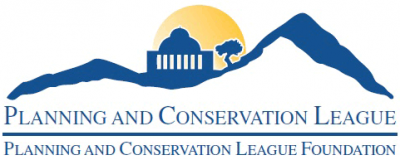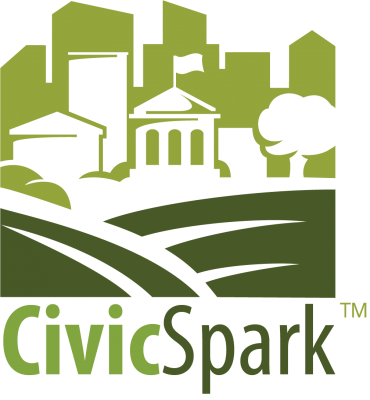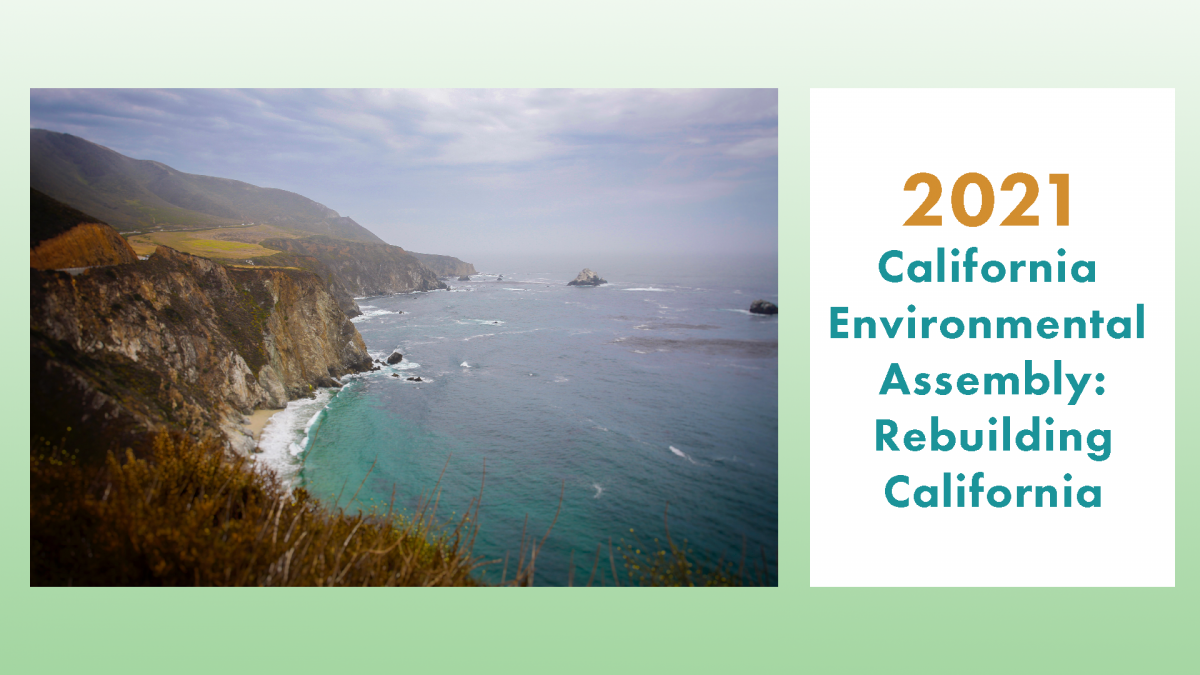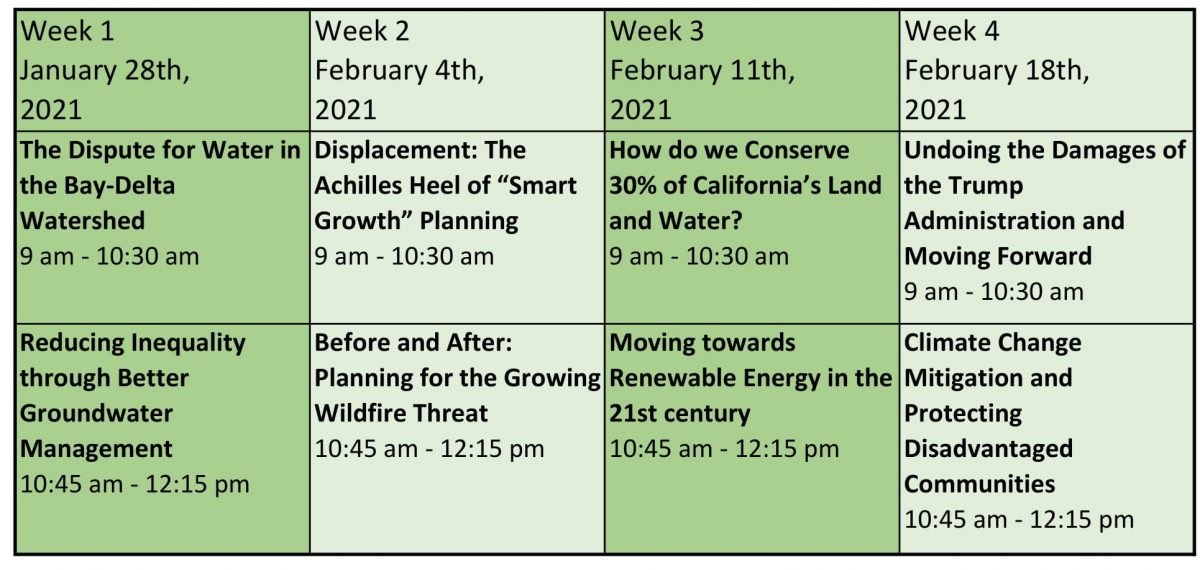2021 California Environmental Assembly Webinars
You’re Invited!
Join the Planning and Conservation League for the annual California Environmental Assembly! This year, the event is going virtual!
What: Planning and Conservation League’s 2021 California Environmental Assembly
When: January 28th, February 4th, February 11th, and February 18th, 2021
Where: Online. Zoom links will be provided after registration.
The focus of the 2021 Assembly will be on Rebuilding California! The 2021 PCL Assembly will have a total of eight sessions with two sessions held each day for a duration of four weeks. The sessions will focus on water, land use and transportation, CEQA and environmental litigation, habitat conservation, and renewable energy. Each session will also include themes on environmental justice and equity. Our goal this year is to engage the audience in helping develop strategies on how to achieve meaningful reform by including interactive brainstorming sessions as part of each panel. Come join us in helping rebuild California!
If you would like to support PCL’s efforts in organizing the 2021 Assembly or our work in general, click here to donate to the organization.
2021 Assembly Schedule
2021 Assembly Program
2021 CALIFORNIA ENVIRONMENTAL ASSEMBLY
Rebuilding California
January 28th - February 18th, 2021
Session One: The Dispute for Water in the Bay-Delta Watershed
The allocation of water in the Bay-Delta Watershed has been a long disputed topic. Under the Clean Water Act, the state is required to develop a plan for how much water is to remain in the watershed and how much is to be allocated and to update this plan every three years. However, the Bay-Delta Water Quality Control plan has not been substantially updated since 1995 - over 25 years ago. In the 2020 Water Resilience Portfolio, Governor Newsom set a state goal not to update the plan but rather to focus on developing voluntary agreements. These agreements would be developed by the water rights users, mainly water districts, in which they would agree to use a certain amount of water from the watershed. Unlike a Water Quality Control Plan, which starts by identifying how much water is in the delta and how much should remain in the ecosystem, voluntary agreements would focus on the needs of water users first. This session would discuss the problems with using voluntary agreements to regulate water use and strategies on how to convince the Newsom administration to focus on updating the Water Quality Control Plan.
Moderator -Jonas Minton, Senior Water Policy Advisor, Planning and Conservation League
Panelists
Gary Bobker, Director, The Bay Institute
Tam Doduc, Board Member, California State Water Resources Control Board
Rachel Zwillinger, Water Policy Advisor, Defenders of Wildlife
Jon Rosenfield, Senior Scientist, San Francisco Baykeeper
Session Two: Reducing Inequality through Better Groundwater Management
Water and inequality are closely tied together as water allocation and scarcity is a strong factor in maintaining inequality. This is particularly true for groundwater as this resource is particularly rare and is a necessity for communities living far from bodies of fresh water. Current groundwater management strategies rarely focus on managing groundwater in a way that protects the interests of disadvantaged groups and the environment. This session will focus on identifying the lapses in current management methodology and offer solutions on how to better manage groundwater with all interests in mind.
Moderator -Jennifer Clary, California Director, Clean Water Action
Panelists
Justine Massey, Policy Advocate, Community Water Center
Amanda Monaco, Water Policy Coordinator, Leadership Counsel for Justice and Accountability
Susan Fricke, Water Quality Program Manager, Karuk Tribe Department of Natural Resources
Angela Islas, Community Development Specialist, Self-Help Enterprises
Session Three: Displacement: The Achilles heel of “Smart Growth” Advocacy
PCL and so many other environmental organizations have long been advocating for infill and densification
of our communities, to protect our natural and working lands, and to meet our climate goals. But in
recent years there is a growing recognition of the gentrification and displacement pressures that
this infill investment puts on low-income families in these communities. If our infill investments are not
inclusionary and protect against displacement, we not only undercut our ability to meet our climate
goals by forcing low-wage workers into long commutes, we perpetuate, rather than disrupt, historic
patterns of segregation.
Moderator - Matthew Baker, Policy Director, Planning and Conservation League
Panelists
Gabby Trejo, Executive Director, Sacramento Area Congregations Together (SacACT)
Karen Chapple, Chair and Professor of City and Regional Planning, University of California, Berkeley
Susan Hunter, Housing Justice Coordinator, Housing Is a Human Right
Grecia Elenes, Senior Policy Advocate, Leadership Counsel for Justice and Accountability
Session Four: Before and After: Planning for the Growing Wildfire Threat
With the ever-increasing severity and frequency of wildfires, we have significant ongoing challenges with our Wildland Urban Interface regions and wildfire zones throughout California. We need a whole-of-government approach to dealing with our disasters, and this session will address those current and future challenges of wildfires and the regions that are the most threatened.
Additionally, how we recover after a wildfire or other disasters such as earthquakes, flooding, sea-level rise, and pandemics is as important as how we prepare for and prevent disasters. This session will also focus on a Pre-Disaster Recovery Planning solution that will identify policy and protocol recommendations to address the challenges of land use planning for community needs before a disaster hits, in turn, enabling accelerated rebuilding after a disaster that is both sustainable and equitable.
Recovery from our current health pandemic does not have the physical rebuilding considerations that a fire or flood would entail, yet, Covid has laid bare the stark inequalities of our society, and our lack of preparedness to protect those most in need in a disaster. Covid has demonstrated that, when the time does come to rebuild, it will be all the more important to plan for that development to be environmentally sustainable for the long term, while providing for the needs of our most vulnerable, first.
Moderator - Howard Penn, Executive Director, Planning and Conservation League
Panelists
Rick Halsey, Founder, California Chaparral Institute
Erik de Kok, Program Manager: Planning & Community Development, Governor’s Office of Planning and Research (OPR)
Veronica Beaty, Research Manager, California Coalition for Rural Housing
Kate Dargan, Former California State Fire Marshal, California Fire Safe Council
Session Five: How do we conserve 30% of California’s land and water?
Governor Newsom’s recent executive order set a lofty goal of conserving 30% of California’s land and water by 2030. Scientists have long argued that we need to set aside half of Earth’s landmass if we are to save our planet from heading into a mass extinction event. Are these goals possible and how do we go about protecting large areas of land and water from human use? This panel of experts will attempt to answer these questions and give insight into some of the work they’ve been doing.
Opening Remarks -Wade Crowfoot, Secretary of Natural Resources
Moderator -Jonathan B. Jarvis, Chairman of the Board, UC Berkeley Institute for Parks, People and Biodiversity
Panelists
Jennifer Norris, Deputy Secretary for Biodiversity and Habitat, California Natural Resources Agency
Andrea Leon-Grossmann, Climate Action Director, Azul.
Session Six: Moving Towards Renewable Energy in the 21st Century
California’s ambitious climate and energy policies call for the development of significant amounts of new zero-carbon energy by mid-century. California has also set ambitious goals to combat the biodiversity and climate change crises using nature-based solutions, notably by conserving at least 30% of California’s land and coastal waters by 2030. As you will hear from panelists, these goals can easily result in conflict as many land and offshore areas have both high renewable resource potential and important conservation values. This session will frame these co-equal goals and explore challenges and pathways to achieve both while minimizing impacts. Panelists will share opportunities to get engaged in policy, planning, and implementation discussions underway that will shape California’s choices to meet clean energy and conservation goals and avoid the worst impacts of catastrophic climate change.
Moderator -Terrell Watt, Owner, Terrell Watt Planning Consultants
Panelists
Karen Douglas, Commissioner, California Energy Commission
Maya Batres, Project Manager, Energy and Land Use, The Nature Conservancy California
Kate Kelly, Principal, Kelly Group
Kim Delfino, Founder, Earth Advocacy
Sydney Chamberlin, Climate Policy Associate, The Nature Conservancy
Matthew Baker, Deputy Secretary of Energy, California Natural Resources Agency
Eli Harland, Associate Energy Specialist, California Energy Commission
Session Seven: Undoing the Damages of the Trump Administration and Moving Forward
The former Trump Administration, by omission and commission, dramatically reduced the enforcement scope of federal environmental laws and regulations, leading to several dozen environmental lawsuits by the State of California; other states; and national and regional environmental groups. The arrival of the Biden Administration has created the opportunity to "undo" the widespread reduction of federal environmental protections. In this context, the University of California at Berkeley has for some time been working to catalog the full range of rollbacks.
The California Department of Justice ("DOJ") is now in the process of prioritizing its opportunities to settle; otherwise, conclude or pursue its many pending lawsuits. Our panel will provide an overview of " damages done" and lead a discussion of pending options for select divisions of the DOJ; other State Attorney Generals; and environmental groups to move forward with corrective actions. The discussion will also consider select, "new opportunities" to not just restore but enhance environmental protections for disadvantaged communities.
Moderator -Kevin Johnson, Attorney and Founder, Kevin Johnson, A Professional Law Corporation
Panelists
Matt Rodriquez, Acting Chief Deputy Attorney General, Department of Justice
Ken Alex, Director of Project Climate, University of California, Berkeley
Yana Garcia, Deputy Secretary for Environmental Justice, CalEPA
Session Eight: Climate Change Mitigation and Protecting Disadvantaged Communities
The effects of climate change can be seen all over California. From raging wildfires, increased pollution, and hotter temperatures, climate change affects all Californians but is a major problem to the livelihoods of low-income communities and communities of color. This session will discuss the most recent litigation focused on protecting disadvantaged communities from the effects of climate change.
The session will also discuss SB 1000, which requires local governments to identify disadvantaged communities and address inequalities posed to these communities as part of their general plans. This includes improving public engagement in the local government decision-making process, reducing pollution, and promoting access to health care, housing, recreation, and healthy food options. This session will discuss the process of ensuring local governments comply with this law and develop strong Justice, Equity, Diversity, and Inclusion (JEDI) policies and programs.
Moderator - Douglas Carstens, Managing Partner, Chatten-Brown, Carstens & Minteer
Panelists
Natalia Ospina, Project Attorney, Environmental Justice, NRDC
Adrian Martinez, Staff Attorney, Earthjustice
Jennifer Ganata, Senior Staff Attorney, Communities for a Better Environment
Dr. Martha Dina-Arguello, Executive Director, Physicians for Social Responsibility
Hosts & Partners

Co-Host

Co-Host
Sponsors
Gold Sponsors
Silver Sponsors
Bronze Sponsors
Environment Now
National Wildlife Federation
Kevin K. Johnson, APLC
Mogavero Architects, Inc.
Ralph B. Perry III
Remy Moose Manley, LLP
SMUD
Lozeau Drury, LLP
Wittwer Parkin, LLP
Emerging Sponsors
Center for Biological Diversity
M.R. Wolfe & Associates, PC
Contributing Sponsors
Holland and Knight LLP
Margie Kay
Valley Land Alliance
Andy Sawyer & Carol Bingham
Friends of Harbors, Beaches & Parks
Defenders of Wildlife
Monica Hunter
Environmental Defense Center
Law Office of Roger B. Moore


